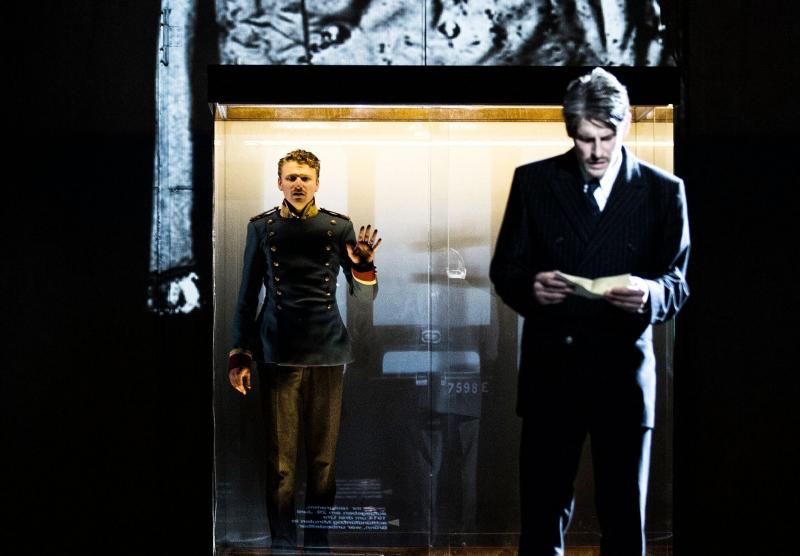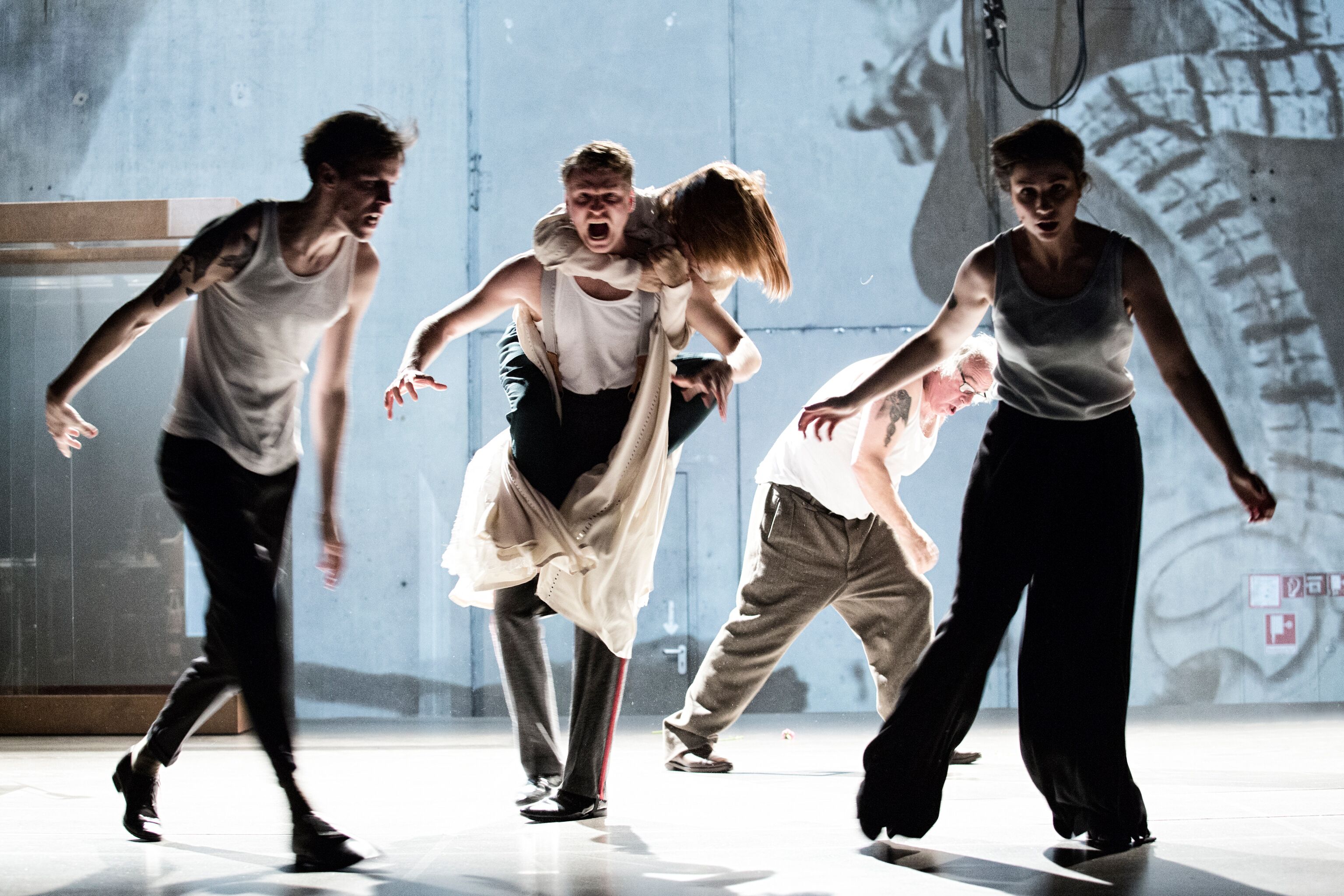Beware of Pity, Complicite & Schaubühne Berlin, Barbican | reviews, news & interviews
Beware of Pity, Complicite & Schaubühne Berlin, Barbican
Beware of Pity, Complicite & Schaubühne Berlin, Barbican
Zweig's tale of moral equivocation becomes a tense radio-play with optional visual extras

Prolific, fitfully great Austrian writer Stefan Zweig's two biggest popular biographies, Marie Antoinette: The Story of an Average Woman and Mary Stuart, would be a gift for any screenwriter, given their fully realised dramatic scenes.
A remarkable amount of the text is here and to hear it in the original language from the fine ensemble of the Schaubühne Berlin is certainly enriching, however rapidly it passes. Problems first, though. This is yet another of those productions from the continent where all the actors are miked up, sometimes distortingly and so flatly that you can never tell where the voice is coming from on the stage – a loss when the narration is delivered polyphonically. Peter Malkin's sound design is saturated in music, too, always telling us how to think and feel, with snatches of Mahler slow movements for heightened emotion alongside more minimalist music that's much more banal. Both elements detract from the actors' craft.
There's surprisingly little of the physical theatre we expect from Complicite – you know it when you see it, as in a late sequence where the officer brutally breaks in a horse in his frustration at not being able to act when it comes to human beings (pictured below). The old photos and First World War footage – again, until the end, when a richer dimension makes a sudden bid for crucial messaging – take the text too literally. Again, the imagination would work better if this were a radio broadcast. Where McBurney's trademark works best, though, is in the urgent telling of a story. As in his utterly compelling one-man drama The Encounter, we're drawn in to one man's story by another – in this case, the novelist (we're to presume Zweig himself) who meets the protagonist in a cafe in the 1930s. And then the older Anton Hofmiller (Christoph Gawenda) dovetails with his younger self (Laurenz Laufenberg) and multiple voices reinforce his breathless narration, as he tells the author how he came to meet wealthy Austro-Hungarian Lajor Kekesfalva and his invalid daughter Edith.
Where McBurney's trademark works best, though, is in the urgent telling of a story. As in his utterly compelling one-man drama The Encounter, we're drawn in to one man's story by another – in this case, the novelist (we're to presume Zweig himself) who meets the protagonist in a cafe in the 1930s. And then the older Anton Hofmiller (Christoph Gawenda) dovetails with his younger self (Laurenz Laufenberg) and multiple voices reinforce his breathless narration, as he tells the author how he came to meet wealthy Austro-Hungarian Lajor Kekesfalva and his invalid daughter Edith.
We then embark on a helter-skelter ride of Hofmiller's alternation between pity and repulsion, and the suspenseful, fateful knowledge that his weakness in trying to bring her happiness is going to end in disaster. McBurney and his actors build an extraordinary tension at times, especially in the climactic narrative of the eight days in which Anton must play a part (in more than one sense) in aiding the girl's latest search for a cure. Paradoxically, the most striking scene on stage, with its stress on the narrator's fear of female sexuality, is played out in near-darkness.
The main story sometimes seems a little absurd in compression, Anton's wavering and putting off the inevitable moment when he tells the girl he can't love her maddening rather than dreadfully sad, and it isn't helped by Marie Burchard's unsympathetic, raspy-miked portrayal of Edith's neuroses when what we need to notice is her emotional intelligence. Eva Meckbach, playing both her cousin and the timid companion whose legacy Kekesfalva takes advantage of in a compelling tale-within-a-tale, makes a bigger mark, not easy in among the information overload.
McBurney seems right in assuming that Zweig wants us to see a bigger issue in Anton's moral equivocation, how indecision, weakness and lack of self-knowledge – an essential component in the device of the "unreliable narrator", Henry James-style – can play their part in larger scale catastrophes. I won't spoil the final sequence by describing it, but it does ultimately justify seeing the drama on stage. Let's just say that with the Commons caving in to a chimera, and May grovelling to Trump, the lesson of moral faltering is stronger than ever. Up to that point, sorry to insist, it's just a radio play with visual extras – but still Zweig's story is a compelling one, and strikingly told.
- Beware of Pity at the Barbican until 12 February – sold out – followed by Schaubühne Berlin's Richard III (16-19 February)
- Live stream on Complicite's YouTube channel on 12 February, available until 26 February
- David Nice's blog on a walk around Stefan Zweig territory in Salzburg
- Read more theatre reviews on theartsdesk
The future of Arts Journalism
You can stop theartsdesk.com closing!
We urgently need financing to survive. Our fundraising drive has thus far raised £49,000 but we need to reach £100,000 or we will be forced to close. Please contribute here: https://gofund.me/c3f6033d
And if you can forward this information to anyone who might assist, we’d be grateful.

Subscribe to theartsdesk.com
Thank you for continuing to read our work on theartsdesk.com. For unlimited access to every article in its entirety, including our archive of more than 15,000 pieces, we're asking for £5 per month or £40 per year. We feel it's a very good deal, and hope you do too.
To take a subscription now simply click here.
And if you're looking for that extra gift for a friend or family member, why not treat them to a theartsdesk.com gift subscription?
more Theatre
 Little Brother, Soho Theatre review - light, bright but emotionally true
This Verity Bargate Award-winning dramedy is entertaining as well as thought provoking
Little Brother, Soho Theatre review - light, bright but emotionally true
This Verity Bargate Award-winning dramedy is entertaining as well as thought provoking
 The Unbelievers, Royal Court Theatre - grimly compelling, powerfully performed
Nick Payne's new play is amongst his best
The Unbelievers, Royal Court Theatre - grimly compelling, powerfully performed
Nick Payne's new play is amongst his best
 The Maids, Donmar Warehouse review - vibrant cast lost in a spectacular-looking fever dream
Kip Williams revises Genet, with little gained in the update except eye-popping visuals
The Maids, Donmar Warehouse review - vibrant cast lost in a spectacular-looking fever dream
Kip Williams revises Genet, with little gained in the update except eye-popping visuals
 Ragdoll, Jermyn Street Theatre review - compelling and emotionally truthful
Katherine Moar returns with a Patty Hearst-inspired follow up to her debut hit 'Farm Hall'
Ragdoll, Jermyn Street Theatre review - compelling and emotionally truthful
Katherine Moar returns with a Patty Hearst-inspired follow up to her debut hit 'Farm Hall'
 Troilus and Cressida, Globe Theatre review - a 'problem play' with added problems
Raucous and carnivalesque, but also ugly and incomprehensible
Troilus and Cressida, Globe Theatre review - a 'problem play' with added problems
Raucous and carnivalesque, but also ugly and incomprehensible
 Clarkston, Trafalgar Theatre review - two lads on a road to nowhere
Netflix star, Joe Locke, is the selling point of a production that needs one
Clarkston, Trafalgar Theatre review - two lads on a road to nowhere
Netflix star, Joe Locke, is the selling point of a production that needs one
 Ghost Stories, Peacock Theatre review - spirited staging but short on scares
Impressive spectacle saves an ageing show in an unsuitable venue
Ghost Stories, Peacock Theatre review - spirited staging but short on scares
Impressive spectacle saves an ageing show in an unsuitable venue
 Hamlet, National Theatre review - turning tragedy to comedy is no joke
Hiran Abeyeskera’s childlike prince falls flat in a mixed production
Hamlet, National Theatre review - turning tragedy to comedy is no joke
Hiran Abeyeskera’s childlike prince falls flat in a mixed production
 Rohtko, Barbican review - postmodern meditation on fake and authentic art is less than the sum of its parts
Łukasz Twarkowski's production dazzles without illuminating
Rohtko, Barbican review - postmodern meditation on fake and authentic art is less than the sum of its parts
Łukasz Twarkowski's production dazzles without illuminating
 Lee, Park Theatre review - Lee Krasner looks back on her life as an artist
Informative and interesting, the play's format limits its potential
Lee, Park Theatre review - Lee Krasner looks back on her life as an artist
Informative and interesting, the play's format limits its potential
 Measure for Measure, RSC, Stratford review - 'problem play' has no problem with relevance
Shakespeare, in this adaptation, is at his most perceptive
Measure for Measure, RSC, Stratford review - 'problem play' has no problem with relevance
Shakespeare, in this adaptation, is at his most perceptive
 The Importance of Being Earnest, Noël Coward Theatre review - dazzling and delightful queer fest
West End transfer of National Theatre hit stars Stephen Fry and Olly Alexander
The Importance of Being Earnest, Noël Coward Theatre review - dazzling and delightful queer fest
West End transfer of National Theatre hit stars Stephen Fry and Olly Alexander

Add comment